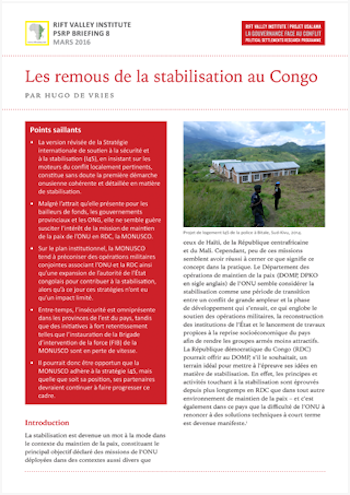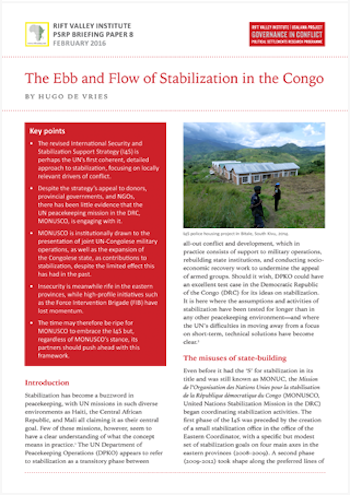La stabilisation est devenue un mot à la mode dans le contexte du maintien de la paix, constituant le principal objectif déclaré des missions de l’ONU déployées dans des contextes aussi divers que ceux de Haïti, de la République…
RVI publishes books, research reports, research papers, briefings and meeting reports in a range of formats. Publications cover policy, research, arts, culture and local knowledge in the countries of eastern and central Africa. Research publications—books, reports and papers—are peer-reviewed. Some RVI publications are also available in French and/or Arabic.
The RVI is a signatory of the Budapest Open Access Initiative (2001); all publications are free for download in PDF format under Creative Commons licences. The views expressed in books and reports published by the RVI are those of the authors, not the Institute.
SEARCH
PUBLICATION TYPE
LANGUAGE
REGION
COUNTRY
<p>Stabilization has become a buzzword in peacekeeping, with UN missions in such diverse environments as Haiti, the Central African Republic, and Mali all claiming it as their central goal. Few of these missions, however, seem to have a clear…
Recent Publications

Minor Demarcations, Micro-Dams—Major Drama? Ethno-territorial expansionism and precarious peace in the Oromia–Somali borderlands of eastern Ethiopia
May 20, 2025
The report highlights the overlapping claims to and distributive struggles over territory and resources in the Oromia-Somali borderlands which animated inter-regional competition between the Oromia Regional State (ORS) and Somali Regional State (SRS), resulted in the brief 2023 uptick in

When Women Sing: How Murle women use arts and cultural mediums to communicate
May 16, 2025
This research explores how Murle women in the Greater Pibor area of central eastern South Sudan use not just songs but dance, hairstyles, body marks and beads to express themselves. Its objective is to draw attention to the ways Murle
Effectiveness of Women in Politics and Improving Gender Equality in South Sudan
May 2, 2025
This report argues that, in order to improve women’s participation in politics and promote gender-responsive policies in the country, there is a need to enlarge government capacity for women’s leadership by introducing equal gender quotas for decision-making positions. Summary Women’s


